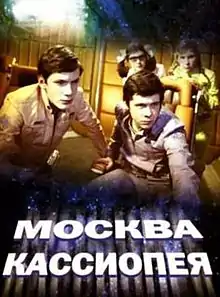| Moscow-Cassiopeia | |
|---|---|
 | |
| Directed by | Richard Viktorov |
| Written by | Isai Kuznetsov Avenir Zak |
| Starring | Innokenty Smoktunovsky Vasili Merkuryev Lev Durov |
| Cinematography | Andrei Kirillov |
| Edited by | Olga Katusheva |
| Music by | Vladimir Chernyshev |
| Distributed by | Gorky Film Studio |
Release date |
|
Running time | 85 minutes |
| Country | Soviet Union |
Moscow-Cassiopeia (Russian: Москва — Кассиопея, romanized: Moskva-Kassiopeya) is a Soviet comic science fiction film directed by Richard Viktorov based on a script by Isai Kuznetsov and Avenir Zak. Followed by Teens in the Universe (second part, 1975).
The film was released in the Soviet cinema on September 23, 1974. Then it was held at the box office in Poland, Germany, Yugoslavia, Czechoslovakia. The film was first showed on TV on November 7, 1976.
Synopsis
From the depths of the universe Earth can hear the radio signals of intelligent beings from a planet of the star system Shedar in the Cassiopeia constellation. A project is set up, proposed by the young inventor Vitya Sereda, to send a spaceship to reach the planet - but the flight will last for decades, so the crew of the spaceship ЗАРЯ or Zarya (an acronym for Spaceship (zvezdolet) Annihilation Relativistical Nuclear (yaderniy), also meaning "dawn"), is to be recruited from teenage students.
The project is all carefully thought out but student Fyodor Lobanov stows away aboard the starship and unwittingly causes it to transcend the speed of light and so reaching its target 27 years ahead of schedule...
Cast
- Innokenty Smoktunovsky as S.S.E. (Special Service Executive)
- Vasili Merkuryev as academician Blagovidov
- Lev Durov as academician Filatov
- Yuri Medvedev as academician Ogon-Duganovsky
- Pyotr Merkuryev as academician Kurochkin
Space ship DAWN crew
- Mikhail Yershov as Victor Sereda
- Aleksandr Grigoryev as Pavel Kozelkov
- Vladimir Savin as Mikhail Kopanygin
- Vladimir Basov Jr. as Feodor Lobanov
- Olga Bityukova as Varvara Kuteishchikova
- Nadezhda Ovcharova as Yulia Sorokina
- Irina Popova as Katya Panfyorova
Other cast
- Anatoly Adoskin
- Natalya Fateyeva
- Nikolai Figurovsky
- Artyom Karapetyan
- Valentina Kutsenko
- Sergei Radchenko
- Raisa Ryazanova
- Nadezhda Semyontsova
- Natalya Strizhenova
- Anna Viktorova
- Nikolai Viktorov
- Mikhail Yanushkevich
Filming
Initially, there was a single script, without dividing into two films, but when the amount of footage exceeded the standard timekeeping of a Soviet film, permission was obtained from the Goskino USSR to shoot two: "Moscow — Cassiopeia" and "Teens in the Universe".[1] This did not affect the filming process in any way, as a result of which in the second film in some episodes the guys look younger than in the first.[2][3] Cosmonaut Georgy Beregovoy was a consultant for the film.
The costumes for the heroes were made of metallized nylon, high boots were equipped with magnetic suction cups, and the astronauts had a sense catcher on their chests that translated from any language of the Universe.[4]
The weightlessness scene was a reference to Stanley Kubrick's 2001: A Space Odyssey and was shot in 4 stages with the participation of Valery Pavlotos, a design engineer at the Yalta Film Studio. The movements of each actor along their own trajectory made a strong impression on the jury of the X "UNIATEC" International competition.[5]
Awards
- Premio for the Best Film for Kids of the All-Union Cinema Festival, Baku, 1974
- Special Premio of the International Cinema Festival of Science Fiction Films, Triest, 1975
- Special Prize of the International Cinema Festival (in the Children films category), Moscow, 1975
- Platero Prize of the International Cinema Festival as the film for the Kids and Youth, Gijón, 1975.
- Diploma of the Moscow Technical Contest of the Films, UNIATEK congress, Moscow, 1976
- State Premio of RSFSR in the honour of Vasilyiev Brothers, 1977.
References
- ↑ Сергей Гуленко (2013-02-22). "Самая добрая фантастика: на съемках "Москва - Кассиопея" киношников обстреляла корабельная артиллерия". КП в Украине. Archived from the original on 2018-06-20. Retrieved 2022-02-08.. In Russian
- ↑ Ольга Битюкова. ""Варька сразу мне понравилась, мы с ней были очень похожи"". Клуб любителей кинодилогии «Москва-Кассиопея» и «Отроки во Вселенной». Описание: Воспоминания. Archived from the original on 2019-03-21. Retrieved 2022-02-08.. In Russian
- ↑ Письмо Исая Кузнецова Archived 2017-09-23 at the Wayback Machine. In Russian
- ↑ "Как снимали фильмы «Москва – Кассиопея» и «Отроки во вселенной»". AesliB.ru. Archived from the original on 2022-03-24. Retrieved 2022-02-08.. In Russian
- ↑ "Гравитация — ноль. Хроники киноневесомости". Культура.РФ. Минкультуры России. Archived from the original on 2021-05-15. Retrieved 2022-02-08.. In Russian
External links
- Moscow-Cassiopeia at IMDb
- Moscow-Cassiopeia is available for free viewing and download at the Internet Archive